Sonnet 18(英文赏析)讲解学习
sonnet18—byWilliamShakespeare赏析
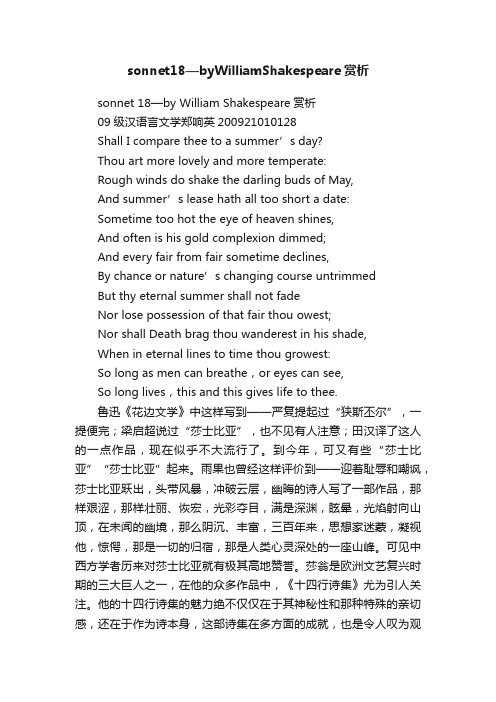
sonnet18—byWilliamShakespeare赏析sonnet 18—by William Shakespeare赏析09级汉语言文学郑响英200921010128Shall I compare thee to a summer’s day?Thou art more lovely and more temperate:Rough winds do shake the darling buds of May,And summer’s lease hath all too short a date:Sometime too hot the eye of heaven shines,And often is his gold complexion dimmed;And every fair from fair sometime declines,By chance or nature’s changing course untrimmedBut thy eternal summer shall not fadeNor lose possession of that fair thou owest;Nor shall Death brag thou wanderest in his shade,When in eternal lines to time thou growest:So long as men can breathe,or eyes can see,So long lives,this and this gives life to thee.鲁迅《花边文学》中这样写到——严复提起过“狭斯丕尔”,一提便完;梁启超说过“莎士比亚”,也不见有人注意;田汉译了这人的一点作品,现在似乎不大流行了。
到今年,可又有些“莎士比亚”“莎士比亚”起来。
雨果也曾经这样评价到——迎着耻辱和嘲讽,莎士比亚跃出,头带风暴,冲破云层,幽晦的诗人写了一部作品,那样艰涩,那样壮丽、恢宏,光彩夺目,满是深渊,眩晕,光焰射向山顶,在未闻的幽境,那么阴沉、丰富,三百年来,思想家迷蒙,凝视他,惊愕,那是一切的归宿,那是人类心灵深处的一座山峰。
莎士比亚十四行诗第十八首的英文评论和赏析

莎士比亚十四行诗第十八首的英文评论和赏析◎ 莎士比亚十四行诗第18首◇ 曹明伦译18 18我是否可以把你比喻成夏天?Shall I compare thee to a summer's day?虽然你比夏天更可爱更温和: Thou art more lovely and more temperate:狂风会使五月娇蕾红消香断,Rough winds do shake the darling buds of May,夏天拥有的时日也转瞬即过; And summer's lease hath all too short a date:有时天空之巨眼目光太炽热,Sometime too hot the eye of heaven shines,它金灿灿的面色也常被遮暗; And often is his gold complexion dimmed,而千芳万艳都终将凋零飘落,And every fair from fair sometime declines,被时运天道之更替剥尽红颜; By chance, or nature's changing course untrimmed:但你永恒的夏天将没有止尽, But thy eternal summer shall not fade,你所拥有的美貌也不会消失, Nor lose possession of that fair thou ow'st,死神终难夸口你游荡于死荫,Nor shall death brag thou wander'st in his shade,当你在不朽的诗中永葆盛时;When in eternal lines to time thou grow'st,只要有人类生存,或人有眼睛,So long as men can breathe, or eyes can see,我的诗就会流传并赋予你生命。
十四行诗18英文赏析-莎士比亚[整理版]
![十四行诗18英文赏析-莎士比亚[整理版]](https://img.taocdn.com/s3/m/faf35c37bdd126fff705cc1755270722192e59c0.png)
莎士比亚的第18首十四行诗的英文赏析我能否将你比作夏天?你比夏天更美丽温婉。
狂风将五月的蓓蕾凋残,夏日的勾留何其短暂。
休恋那丽日当空,转眼会云雾迷蒙。
休叹那百花飘零,催折于无常的天命。
唯有你永恒的夏日常新,你的美貌亦毫发无损。
死神也无缘将你幽禁,你在我永恒的诗中长存。
只要世间尚有人吟诵我的诗篇,这诗就将不朽,永葆你的芳颜。
这首诗的艺术特点首先是在于它有着双重主题:一是赞美诗人爱友的美貌,二是歌颂了诗歌艺术的不朽力量。
其次就是诗人在诗中运用了新颖的比喻,但又自然而生动。
Sonnet 18, often alternately titled Shall I compare thee to a summer's day?, is one of the best-known of 154 sonnets written by the English playwright and poet William Shakespeare. Part of the Fair Y outh sequence (which comprises sonnets 1-126 in the accepted numbering stemming from the first edition in 1609), it is the first of the cycle after the opening sequence now described as the Procreation sonnets. Most scholars now agree that the original subject of the poem, the beloved to whom the poet is writing, is a male, though the poem is commonly used to describe a woman.In the sonnet, the poet compares his beloved to the summer season, and argues that his beloved is better. The poet also states that his beloved will live on forever through the words of the poem. Scholars have found parallels within the poem to Ovid's Tristia and Amores, both of which have love themes. Sonnet 18 is written in the typical Shakespearean sonnet form, having 14 lines of iambic pentameter ending in a rhymed couplet. Detailed exegeses have revealed several double meanings within the poem, giving it a greater depth of interpretation.Sonnet 18 is a typical English or Shakespearean sonnet. It consists of three quatrains followed by a couplet, and has the characteristic rhyme scheme: abab cdcd efef gg. The poem carries the meaning of an Italian or Petrarchan Sonnet. Petrarchan sonnets typically discussed the love and beauty of a beloved, often an unattainable love, but not always.[5] It also contains a volta, or shift in the poem's subject matter, beginning with the third quatrain.A facsimile of the original printing of Sonnet 18.The poem starts with a line of adoration to the beloved—"Shall I compare thee to a summer's day?" The speaker then goes on to say that the beloved being described is both "more lovely and more temperate" than a summer's day. Thespeaker lists some things that are negative about summer. It is too short—"summer's lease hath all too short a date"—and sometimes the sun shines too hot—"Sometime too hot the eye of heaven shines." However, the beloved being described has beauty that will last forever, unlike the fleeting beauty of a summer's day. By putting his love's beauty into the form of poetry, the poet is preserving it forever by the power of his written words. "So long as men can breathe, or eyes can see, So long lives this, and this gives life to thee." The hope is that the two lovers can live on, if not through children, then through the poems brought forth by their love which, unlike children, will not fadeA major feature of this poem - analogy. Begins with the first sentence, put "you" and "Summer" as a analogy, compare the second line of the initial determination: Are you more lovely than the summer, more gentle. The difference is due to produce its in-depth analysis of 3 to 14 lines. Specifically, the first line of 3.4.5.6.7.8 enumerated the "summer" all kinds of regrets, and 9.10.11.12.13.14 line tells the "you" all kinds of advantages compared to the natural draw a final conclusion: "Y ou" is far better than "Summer," "you" because in his poetry between the lines but also has a life, and time forever. Also noteworthy is the verse 13 and 14 are also, by analogy emphasized the "eternal nature."Throughout the poem, the poet freely to the "you" talk, it seems that "you" is a living person, to listen to his voice, understanding his thinking. So this poem can be said to be people in the application of techniques based on the written. The poem "Y ou" refers to an object, academia, there are two explanations, one view is that it refers to beauty, and the other that it refers to poetry to express the good things. Now most scholars prefer the latter.One of the best known of Shakespeare’s sonnets, Sonnet 18 is memorable for the skillful and varied presentation of subject matter, in which the poet’s feelings reach a level of rapture unseen in the previous sonnets. The poet here abandons his quest for the youth to have a child, and instead glories in the youth’s beauty.On the surface, the poem is simply a statement of praise about the beauty of the beloved; summer tends to unpleasant extremes of windiness and heat, but the beloved is always mild and temperate. Summer is incidentally personified as the "eye of heaven" with its "gold complexion"; the imagery throughout is simple and unaffected, with the "darling buds of May" giving way to the "eternal summer", which the speaker promises the beloved. The language, too, is comparatively unadorned for the sonnets; it is not heavy with alliteration or assonance, and nearly every line is its own self-contained clause--almost every line ends with some punctuation, which effects a pause.Initially, the poet poses a question―”Shall I compare thee to a summer’s day?”―and then reflects on it, remarking that the youth’s beauty far surpasses summer’s delights. The imagery is the very essence of simplic ity: “wind”and “buds.”In the fourth line, legal terminology―”summer’s lease”―is introduced in contrast to the commonplace images in the first three lines. Note also the poet’s use of extremes in the phrases “more lovely,”“all too short,”and “too hot”; these phrases emphasize the young man’s beauty.Although lines 9 through 12 are marked by a more expansive tone and deeper feeling, the poetreturns to the simplicity of the opening images. As one expects in Shakespeare’s sonnets, the proposition that the poet sets up in the first eight lines―that all nature is subject to imperfection―is now contrasted in these next four lines beginning with “But.”Although beauty naturally declines at some point―”And every fair from fair sometime declines”―the youth’s beauty will not; his unchanging appearance is atypical of nature’s steady progression. Even death is impotent against the youth’s beauty. Note the ambiguity in the phrase “eternal lines”: Are these “lines”the poet’s verses or the youth’s hoped-for children? Or are they simply wrinkles meant to represent the process of aging? Whatever the answer, the poet is jubilant in this sonnet because nothing threatens the young man’s beautiful appearance.Sonnet 18 is the first poem in the sonnets not to explicitly encourage the young man to have children. The "procreation" sequence of the first 17 sonnets ended with the speaker's realization that the young man might not need children to preserve his beauty; he could also live, the speaker writes at the end of Sonnet 17, "in my rhyme." Sonnet 18, then, is the first "rhyme"--the speaker's first attempt to preserve the young man's beauty for all time. An important theme of the sonnet (as it is an important theme throughout much of the sequence) is the power of the speaker's poem to defy time and last forever, carrying the beauty of the beloved down to future generations. The beloved's "eternal summer" shall not fade precisely because it is embodied in the sonnet: "So long as men can breathe or eyes can see," the speaker writes in the couplet, "So long lives this, and this gives life to thee."大多数莎学家认为,是作者赞美好友的超常之美的。
英国文学8.2讲解Sonnet18

Shakespeare (1564—1616)
“All the world 's a stage, / And all the men and women merely players.”
——William Shakespeare
William Shakespeare(1564—1616)
Nor shall Death brag thou wander’st in his shade,
∨∨— —∨— ∨∨∨ — e When in eternal lines to time thou grow’st; ∨∨∨— ∨— ∨— ∨— f
Sonnet 18
So long as men can breathe, or eyes can see,
可你比夏天更加可爱如绣: 狂风摇曳着五月里的花冠, 夏天的租期不肯太长逗留, a summer’s day?
Rough winds do shake the darling buds of May,
And Summer’s lease Shall I all too short aa date; day? hath compare you to summer's
Sonnet 18
Sometime too hot the eye of heaven shines, ∨— ∨— ∨— ∨— ∨— c And often is his gold complexion dimm’d; ∨— ∨— ∨— ∨— ∨— d And every fair from fair sometime declines, ∨— ∨— ∨— ∨— ∨— c
但是你的妖艳会永不退萎。 你不会失去你拥有的美丽, 死神也惧把你送阴间吹擂; 这时你将于诗中永存与日。
Sonnet 18(英文赏析)
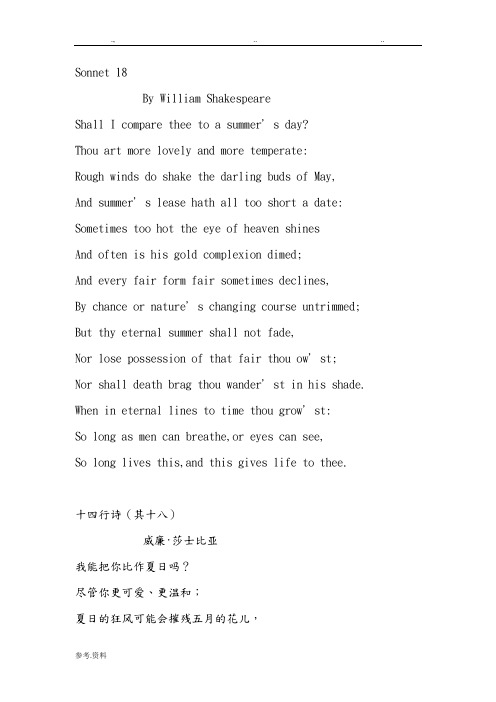
Sonnet 18By William ShakespeareShall I compare thee to a summer’s day?Thou art more lovely and more temperate:Rough winds do shake the darling buds of May, And summer’s lease hath all too short a date: Sometimes too hot the eye of heaven shinesAnd often is his gold complexion dimed;And every fair form fair sometimes declines,By chance or nature’s changing course untrimmed; But thy eternal summer shall not fade,Nor lose possession of that fair thou ow’st;Nor shall death brag thou wander’st in his shade. When in eternal lines to time thou grow’st:So long as men can breathe,or eyes can see,So long lives this,and this gives life to thee.十四行诗(其十八)威廉·莎士比亚我能把你比作夏日吗?尽管你更可爱、更温和;夏日的狂风可能会摧残五月的花儿,季节的限制又减少了可拥有的日光;天空的巨眼有时过于灼热,常使自身的辉煌无故湮没;每一种美都会消逝,不管愿意或是无奈;然而你这盛夏将永存不朽,连你所有的美都不会褪去;死神不忍逼近,生命只会长存;只要人类能呼吸,能看见;我的诗就会存在,而你的生命也会延续。
Sonnet_18(英文赏析)
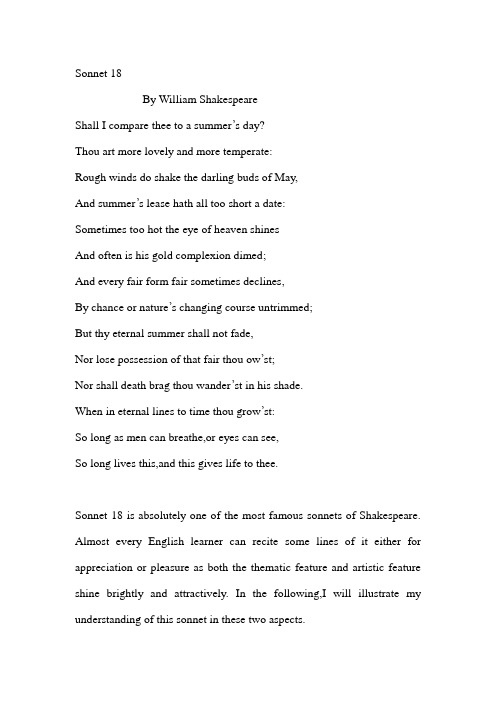
Sonnet 18By William ShakespeareShall I compare thee to a summer’s day?Thou art more lovely and more temperate:Rough winds do shake the darling buds of May,And summer’s lease hath all too short a date:Sometimes too hot the eye of heaven shinesAnd often is his gold complexion dimed;And every fair form fair sometimes declines,By chance or nature’s changing course untrimmed;But thy eternal summer shall not fade,Nor lose possession of that fair thou ow’st;Nor shall death brag thou wander’st in his shade.When in eternal lines to time thou grow’st:So long as men can breathe,or eyes can see,So long lives this,and this gives life to thee.Sonnet 18 is absolutely one of the most famous sonnets of Shakespeare. Almost every English learner can recite some lines of it either for appreciation or pleasure as both the thematic feature and artistic feature shine brightly and attractively. In the following,I will illustrate my understanding of this sonnet in these two aspects.Firstly,something about the sonnet’s thematic feaure.The first two lines ,in the form of a question and an assertive statement, show the poet’s idea of comparing his beloved with a summer’s day and also point out that the beloved person is more beautiful and less extreme than summer. It is understandable that summer is chosen as the comparison target because it is lovely and pleasant. While the next six lines describe the less pleasant aspects of summer:the too stong wind,the extreme hot weather as well as the easy disappearance of all beauties. The ninth line takes up the comparison with summer again: summer has by now become the summer of life. The comparison turns into a contrast by referring back to the seventh. The poet's assurance becomes even firmer in lines eleven and twelve, which contain a promise that death will be conquered that the beloved one’s spirit and life will surely be eternal.The last two lines furthur emphasize the poet’s belief that the eternity of spirit and virtue of his beloved by pointing out the poem’s eternal function and existence.With this arrangement of structure and content,the poet gives this sonnet two thematic meanings.The primary meaning is simply a statement to praise the beauty of the beloved one. But the more important and deep one is the poet’s thought that the power of the poem which can defy time and last forever.Its double themes is one distinguishing feature of the sonnet.Secondly,the analysis of this sonnet’s artistic feature.It contains 14 lines.We can easily observe that the ends of line 1 and line 3 have the end rhyme:/ei/,line 2 and line 4 rhyme with /eit/.And these four lines form a quatrain. The same form is used in the second quatrain from line 5 to line 8,the third quatrain from line 9 to line 12. However,the last two lines have their own form,as they have the end rhyme:/i:/Each line in this sonnet is in iambic pentameter which means each line has five feet, usually an unaccented syllable followed by an accented syllable.For example,we can divide the first line into five independent feet as “Shall I / compare /thee to/ a sum / mer’s day?”with accents on shall,com,thee,a,mer respectively.We can also find some repetitions of the same words in the beginning of several lines,such as the “And” used in the line 6 and 7,the “Nor”in line 10 and 11,the “so long”in line 13 and 14. The alliteration also exists in this sonnet.Both make the sonnet’s tone much more melodious.Some figures of speech are also in use like simile and personification. We can see the sun is regarded as “the eye of heaven” which is a simile. We can find the word “his”used to describe the sun and the death which gives them life as the illustration of the use of personification. This makes the images the poet points out linked to each other and vividly form the whole imagery.To make a general conclusion of its stylistic feature,this sonnet is atypical Shakespearian sonnet with fourteen lines in iambic pentameter, including three quatrains and one couplet with the rhyme scheme ababcdcdefefgg. Besides this, sonnet 18 is in use of alliteration and figures of speech which add more beauty to the tonality of the poem. That’s all my understanding of the distinctive features of William Shakespeare’s Sonnet 18 from thematic and stylistic perspectives.。
sonnet 18 莎士比亚的作品《第十八行诗》赏析 英文版教学文稿

s o n n e t18莎士比亚的作品《第十八行诗》赏析英文版The speaker of the poem opens with a question that is addressed to the beloved, "Shall I compare thee to a summer's day?" This question is comparing her to the summer time of the year. It is during this time when the flowers are blooming, trees are full of leaves, the weather is warm, and it is generally thought of as an enjoyable time during the year. The following eleven lines in the poem are also dedicated to similar comparisons between the beloved and summer days. In lines 2 and 3, the speaker explains what mainly separates the young woman from the summer's day: she is "more lovely and more temperate." (Line 2) Summer's days tend toward extremes: they are sometimes shaken by "rough winds" (line3) which happens and is not always as welcoming as the woman. However in line 4, the speaker gives the feeling again that the summer months are often to short by saying, "And summer抯 lease hath tooshort a date." In the summer days, the sun, "the eye of heaven" (line 5), often shines "too hot," or too dim, "his gold complexion dimmed" (line 6), that is there are many hot days during the summer but soon the sun begins to set earlier at night because autumn is approaching. Summer is moving along too quickly for the speaker, its time here needs to be longer, and it also means that the chilling of autumn is coming upon us because the flowers will soon be withering, as "every fair from fair sometime declines." (Line 7) The final portion of the sonnet tells how the beloved differs from the summer in various respects. Her beauty will be one that lasts forever, "Thy eternal summer shall not fade." (Line 9), and never end or die. In the couplet at the bottom, the speaker explains how that the beloved's beauty will accomplish this everlasting life unlike a summer. And it is because her beauty is kept alive in this poem, which will last forever. It will live "as long as men can breathe or eyes can see." (Line 13)On the surface, the poem is on the surface simply a statement of praise about the beauty of the beloved woman and perhaps summer to the speaker is sometimes too unpleasant with the extremes of windiness and heat that go along with it. However, the beloved in the poem is always mild and temperate by her nature and nothing at all like the summer. It is incidentally brought to life as being described as the "eye of heaven" with its "gold complexion". The imagery throughout the sonnet is simple and attainable to the reader, which is a key factor in understanding the poem. Then the speaker begins to describe the summer again with the "darling buds of May" giving way to the " summer’s lease", springtime moving into the warmth of the summer. The speaker then starts to promise to talk about this beloved, that is so great and awing that she is to live forever in this sonnet. The beloved is so great that the speaker will even go as far as to say that, "So long as men breathe, or eyes can see," the woman will live. The language is almost too simple when comparing it to the rest of Shakespeare’s sonnets; it is not heavy with alliteration or verse, and nearly every line is its own self-contained clause, almost every line ends with some punctuation that effects a pause. But it is this that makes Sonnet18 stand out for the rest in the book. It is much more attainable to understand and it allows for the reader to fully understand how great this beloved truly is because she may live forever in it. An important theme of the sonnet, as it is an important theme throughout much of the poetry in general, is the power of the speaker's poem to defy time and last forever. And so by doing this itis then carrying the beauty of the beloved down to future generations and eventually for al of eternity. The beloved's "eternal summer" shall not fade precisely because it is embodied in the sonnet: "So long as men can breathe or eyes can see," (line 13) the speaker writes in the couplet, "So long lives this, and this gives life to thee."(Line 14) With this the speaker is able to accomplish what many have done in poetry and that is to give the gift of an eternal life to someone that they believe is special and outshines everyone else around them. Perhaps it is because of a physical beauty that the speaker see, but I believe that it is more because of the internal beauty as seen in line 2, "Thou art more lovely and more temperate", that the beloved is deserving to live on forever.。
Sonnet_18(英文赏析)

Sonnet 18By William ShakespeareShall I compare thee to a summer’s day?Thou art more lovely and more temperate: Rough winds do shake the darling buds of May, And summer’s lease hath all too short a date: Sometimes too hot the eye of heaven shinesAnd often is his gold complexion dimed;And every fair form fair sometimes declines,By chance or nature’s changing course untrimmed; But thy eternal summer shall not fade,Nor lose possession of that fair thou ow’st;Nor shall death brag thou wander’st in his shade. When in eternal lines to time thou grow’st:So long as men can breathe,or eyes can see,So long lives this,and this gives life to thee.十四行诗(其十八)威廉·莎士比亚我能把你比作夏日吗?尽管你更可爱、更温和;夏日的狂风可能会摧残五月的花儿,季节的限制又减少了可拥有的日光;天空的巨眼有时过于灼热,常使自身的辉煌无故湮没;每一种美都会消逝,不管愿意或是无奈;然而你这盛夏将永存不朽,连你所有的美都不会褪去;死神不忍逼近,生命只会长存;只要人类能呼吸,能看见;我的诗就会存在,而你的生命也会延续。
sonnet18诗歌解析
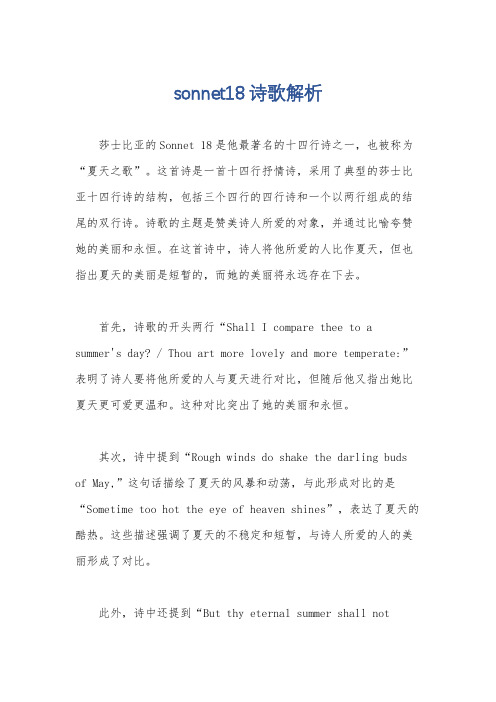
sonnet18诗歌解析莎士比亚的Sonnet 18是他最著名的十四行诗之一,也被称为“夏天之歌”。
这首诗是一首十四行抒情诗,采用了典型的莎士比亚十四行诗的结构,包括三个四行的四行诗和一个以两行组成的结尾的双行诗。
诗歌的主题是赞美诗人所爱的对象,并通过比喻夸赞她的美丽和永恒。
在这首诗中,诗人将他所爱的人比作夏天,但也指出夏天的美丽是短暂的,而她的美丽将永远存在下去。
首先,诗歌的开头两行“Shall I compare thee to a summer's day? / Thou art more lovely and more temperate:”表明了诗人要将他所爱的人与夏天进行对比,但随后他又指出她比夏天更可爱更温和。
这种对比突出了她的美丽和永恒。
其次,诗中提到“Rough winds do shake the darling buds of May,”这句话描绘了夏天的风暴和动荡,与此形成对比的是“Sometime too hot the eye of heaven shines”,表达了夏天的酷热。
这些描述强调了夏天的不稳定和短暂,与诗人所爱的人的美丽形成了对比。
此外,诗中还提到“But thy eternal summer shall notfade”,这句话表达了诗人对所爱人美丽永恒的信念,即使时间流逝,她的美丽也不会凋谢。
最后,诗歌的结尾两行“So long as men can breathe oreyes can see, / So long lives this, and this gives life to thee.”表达了诗人的信念,即只要人类存在,这首诗也将永存下去,而她的美丽也将因此而得以永生。
总的来说,Sonnet 18是一首赞美之歌,通过对比夏天的短暂和变化与所爱人的永恒美丽,表达了诗人对所爱人的赞美和珍视之情。
这首诗以其优美的语言和深刻的意境,成为了莎士比亚诗歌中的经典之作。
sonnet 18诗歌赏析
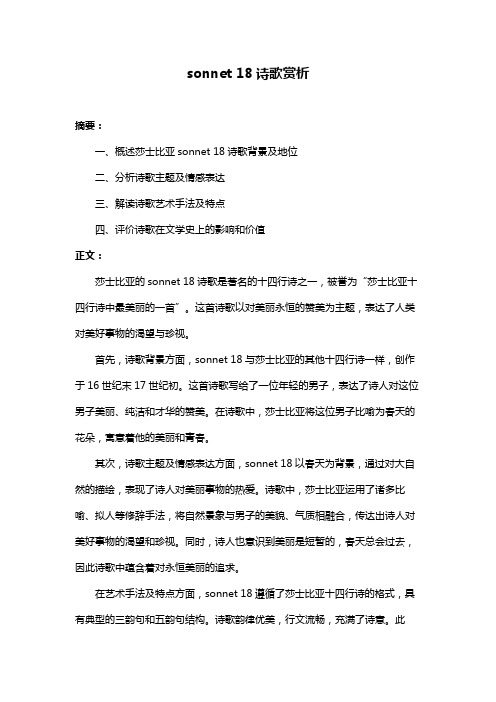
sonnet 18诗歌赏析摘要:一、概述莎士比亚sonnet 18诗歌背景及地位二、分析诗歌主题及情感表达三、解读诗歌艺术手法及特点四、评价诗歌在文学史上的影响和价值正文:莎士比亚的sonnet 18诗歌是著名的十四行诗之一,被誉为“莎士比亚十四行诗中最美丽的一首”。
这首诗歌以对美丽永恒的赞美为主题,表达了人类对美好事物的渴望与珍视。
首先,诗歌背景方面,sonnet 18与莎士比亚的其他十四行诗一样,创作于16世纪末17世纪初。
这首诗歌写给了一位年轻的男子,表达了诗人对这位男子美丽、纯洁和才华的赞美。
在诗歌中,莎士比亚将这位男子比喻为春天的花朵,寓意着他的美丽和青春。
其次,诗歌主题及情感表达方面,sonnet 18以春天为背景,通过对大自然的描绘,表现了诗人对美丽事物的热爱。
诗歌中,莎士比亚运用了诸多比喻、拟人等修辞手法,将自然景象与男子的美貌、气质相融合,传达出诗人对美好事物的渴望和珍视。
同时,诗人也意识到美丽是短暂的,春天总会过去,因此诗歌中蕴含着对永恒美丽的追求。
在艺术手法及特点方面,sonnet 18遵循了莎士比亚十四行诗的格式,具有典型的三韵句和五韵句结构。
诗歌韵律优美,行文流畅,充满了诗意。
此外,诗人巧妙地运用了押韵、抑扬顿挫等手法,使诗歌更具音乐性。
在语言上,莎士比亚运用了大量生动的描绘性词汇,形象地展现了大自然的美丽。
最后,在文学史上的影响和价值方面,sonnet 18被誉为莎士比亚十四行诗的代表作之一,对后世文学创作产生了深远的影响。
这首诗歌展示了莎士比亚卓越的文学才华和审美观,为后世诗人树立了典范。
同时,sonnet 18也成为了英语文学史上不可或缺的一部分,丰富了英语诗歌的传统。
总之,莎士比亚的sonnet 18是一首表达了对美丽永恒追求的诗歌。
通过对春天景象和男子美貌的赞美,诗人展现了人类对美好事物的渴望与珍视。
Sonnet18及赏析(可编辑修改版).

point, seems to be just the speaker’s opinion, but to prove the poem more temperate, he explains, “Rough winds do shake the darling buds of May”: the “rough winds” that blow the young buds of flowers about is certainly not mild or temperate. And also summer just does not last very long; it has “all too short a date.”The poem, when compared to a summer’s day, is better; its beauty and mildness do not end as summer along with its “summer’s day”does. The reader wonder why the speaker, just after claiming his intention of comparing the poem to a “summer’s day,” then first compares it to a spring day—“the darling buds of May.”Even before summer begins, the May flowers are being tossed about by intemperate breezes; therefore, it stands to reason that if the prelude to summer has its difficulties, one can expect summer have its own unique problems that the poem, of course, will lack. Second Quatrain –“Sometime too hot the eye of heaven shines” In the second quatrain, the speaker continues elucidating his complaints that diminish summer’s value in this comparison: sometimes the sunshine makes the temperature too hot: “Sometime too hot the eye of heaven shines.” The sun often hides behind clouds, “often is his gold complexion dimm’d.”The reader can realize the implications here: that these inconvenient qualities do no plague the poem. Then the speaker makes a generalization that everything in nature including the seasons—and he has chosen the best season, after all; he did not advantage his argument by comparing the poem to a winter day—and even people degenerates with time, either by happenstance or by processes the human mind does not comprehend or simply by the unstoppable course of nature: "And every fair from fair sometime declines, / By chance, or nature’s changing course untrimm’d.” So far, the speaker has mused that he shall compare the poem to a summer day, and the summer day is losing: even before summer begins, the winds of May are often brutal to the young flowers; summer never lasts long; sometimes the sun is too hot and sometimes it hides behind clouds, and besides everything—even the good things—in nature diminishes in time. Third Quatrain –“But thy eternal summer shall not fade” In the third quatrain, the speaker declares the advantages that the poem has over the summer day: that unlike the summer day, the poem shall remain eternally; its summer will not end as the natural summer day must. Nor will the poem lose its beauty, and even death cannot claim the poem, because it will exist “in eternal lines”that the poet will continue to write, “When in eternal lines to time thou grow’st.” The Couplet –“This gives life to thee” The couplet—“So long as men can breathe, or eyes can see, / So long lives this, and this gives life to thee”—claims that as long as someone is alive to read it, the poem will have life.。
莎士比亚sonnet18赏析解析莎士比亚十四行诗的主题
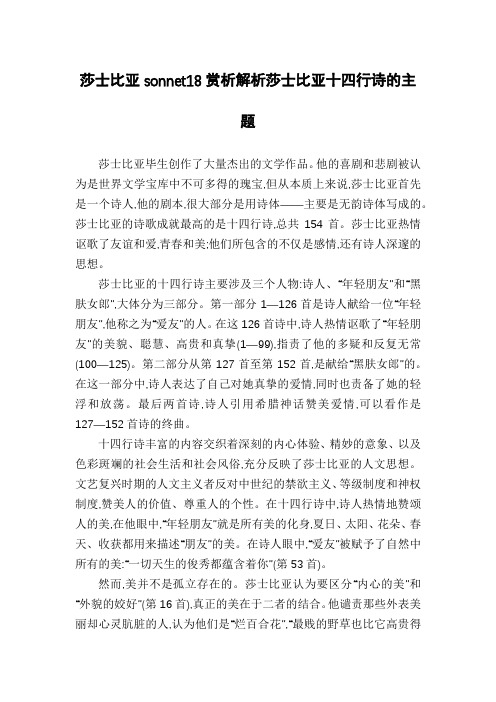
莎士比亚sonnet18赏析解析莎士比亚十四行诗的主题莎士比亚毕生创作了大量杰出的文学作品。
他的喜剧和悲剧被认为是世界文学宝库中不可多得的瑰宝,但从本质上来说,莎士比亚首先是一个诗人,他的剧本,很大部分是用诗体――主要是无韵诗体写成的。
莎士比亚的诗歌成就最高的是十四行诗,总共154首。
莎士比亚热情讴歌了友谊和爱,青春和美;他们所包含的不仅是感情,还有诗人深邃的思想。
莎士比亚的十四行诗主要涉及三个人物:诗人、“年轻朋友”和“黑肤女郎”,大体分为三部分。
第一部分1―126首是诗人献给一位“年轻朋友”,他称之为“爱友”的人。
在这126首诗中,诗人热情讴歌了“年轻朋友”的美貌、聪慧、高贵和真挚(1―99),指责了他的多疑和反复无常(100―125)。
第二部分从第127首至第152首,是献给“黑肤女郎”的。
在这一部分中,诗人表达了自己对她真挚的爱情,同时也责备了她的轻浮和放荡。
最后两首诗,诗人引用希腊神话赞美爱情,可以看作是127―152首诗的终曲。
十四行诗丰富的内容交织着深刻的内心体验、精妙的意象、以及色彩斑斓的社会生活和社会风俗,充分反映了莎士比亚的人文思想。
文艺复兴时期的人文主义者反对中世纪的禁欲主义、等级制度和神权制度,赞美人的价值、尊重人的个性。
在十四行诗中,诗人热情地赞颂人的美,在他眼中,“年轻朋友”就是所有美的化身,夏日、太阳、花朵、春天、收获都用来描述“朋友”的美。
在诗人眼中,“爱友”被赋予了自然中所有的美:“一切天生的俊秀都蕴含着你”(第53首)。
然而,美并不是孤立存在的。
莎士比亚认为要区分“内心的美”和“外貌的姣好”(第16首),真正的美在于二者的结合。
他谴责那些外表美丽却心灵肮脏的人,认为他们是“烂百合花”,“最贱的野草也比它高贵得多”(第94首)。
诗人不但赞颂人的美,还赞颂人的永恒。
在十四行诗中,莎士比亚经常提到时间,认为它是青春和美丽不共戴天的敌人。
因为时间“要把你青春的白昼化作黑夜”(第15首),所以美会变丑、生命会终结。
sonnet 18 莎士比亚的作品《第十八行诗》赏析 英文版教学文稿

s o n n e t18莎士比亚的作品《第十八行诗》赏析英文版The speaker of the poem opens with a question that is addressed to the beloved, "Shall I compare thee to a summer's day?" This question is comparing her to the summer time of the year. It is during this time when the flowers are blooming, trees are full of leaves, the weather is warm, and it is generally thought of as an enjoyable time during the year. The following eleven lines in the poem are also dedicated to similar comparisons between the beloved and summer days. In lines 2 and 3, the speaker explains what mainly separates the young woman from the summer's day: she is "more lovely and more temperate." (Line 2) Summer's days tend toward extremes: they are sometimes shaken by "rough winds" (line3) which happens and is not always as welcoming as the woman. However in line 4, the speaker gives the feeling again that the summer months are often to short by saying, "And summer抯 lease hath tooshort a date." In the summer days, the sun, "the eye of heaven" (line 5), often shines "too hot," or too dim, "his gold complexion dimmed" (line 6), that is there are many hot days during the summer but soon the sun begins to set earlier at night because autumn is approaching. Summer is moving along too quickly for the speaker, its time here needs to be longer, and it also means that the chilling of autumn is coming upon us because the flowers will soon be withering, as "every fair from fair sometime declines." (Line 7) The final portion of the sonnet tells how the beloved differs from the summer in various respects. Her beauty will be one that lasts forever, "Thy eternal summer shall not fade." (Line 9), and never end or die. In the couplet at the bottom, the speaker explains how that the beloved's beauty will accomplish this everlasting life unlike a summer. And it is because her beauty is kept alive in this poem, which will last forever. It will live "as long as men can breathe or eyes can see." (Line 13)On the surface, the poem is on the surface simply a statement of praise about the beauty of the beloved woman and perhaps summer to the speaker is sometimes too unpleasant with the extremes of windiness and heat that go along with it. However, the beloved in the poem is always mild and temperate by her nature and nothing at all like the summer. It is incidentally brought to life as being described as the "eye of heaven" with its "gold complexion". The imagery throughout the sonnet is simple and attainable to the reader, which is a key factor in understanding the poem. Then the speaker begins to describe the summer again with the "darling buds of May" giving way to the " summer’s lease", springtime moving into the warmth of the summer. The speaker then starts to promise to talk about this beloved, that is so great and awing that she is to live forever in this sonnet. The beloved is so great that the speaker will even go as far as to say that, "So long as men breathe, or eyes can see," the woman will live. The language is almost too simple when comparing it to the rest of Shakespeare’s sonnets; it is not heavy with alliteration or verse, and nearly every line is its own self-contained clause, almost every line ends with some punctuation that effects a pause. But it is this that makes Sonnet18 stand out for the rest in the book. It is much more attainable to understand and it allows for the reader to fully understand how great this beloved truly is because she may live forever in it. An important theme of the sonnet, as it is an important theme throughout much of the poetry in general, is the power of the speaker's poem to defy time and last forever. And so by doing this itis then carrying the beauty of the beloved down to future generations and eventually for al of eternity. The beloved's "eternal summer" shall not fade precisely because it is embodied in the sonnet: "So long as men can breathe or eyes can see," (line 13) the speaker writes in the couplet, "So long lives this, and this gives life to thee."(Line 14) With this the speaker is able to accomplish what many have done in poetry and that is to give the gift of an eternal life to someone that they believe is special and outshines everyone else around them. Perhaps it is because of a physical beauty that the speaker see, but I believe that it is more because of the internal beauty as seen in line 2, "Thou art more lovely and more temperate", that the beloved is deserving to live on forever.。
Sonnet18及赏析
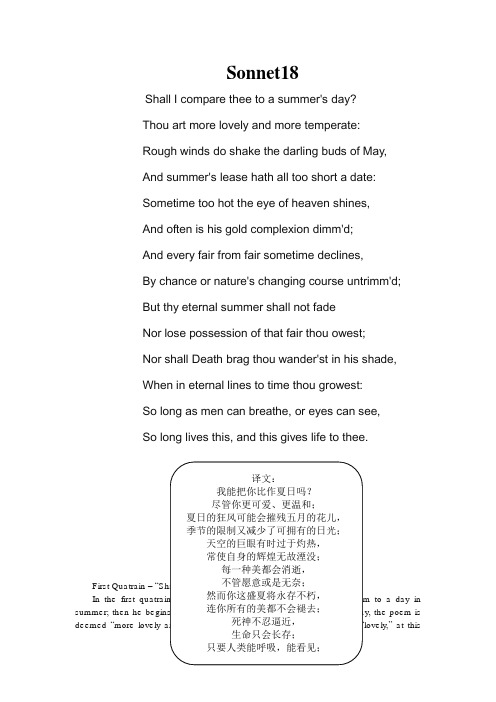
Sonnet18Shall I compare thee to a summer's day?Thou art more lovely and more temperate: Rough winds do shake the darling buds of May, And summer's lease hath all too short a date: Sometime too hot the eye of heaven shines,And often is his gold complexion dimm'd;And every fair from fair sometime declines,By chance or nature's changing course untrimm'd; But thy eternal summer shall not fadeNor lose possession of that fair thou owest;Nor shall Death brag thou wander'st in his shade, When in eternal lines to time thou growest:So long as men can breathe, or eyes can see,So long lives this, and this gives life to thee.point, seems to be just the speaker’s opinion, but to prove the poem more temperate, he explains, “Rough winds do shake the darling buds of May”: the “rough winds” that blow the young buds of flowers about is certainly not mild or temperate. And also summer just does not last very long; it has “all too short a date.”The poem, when compared to a summer’s day, is better; its beauty and mildness do not end as summer along with its “summer’s day”does. The reader wonder why the speaker, just after claiming his intention of comparing the poem to a “summer’s day,” then first compares it to a spring day—“the darling buds of May.”Even before summer begins, the May flowers are being tossed about by intemperate breezes; therefore, it stands to reason that if the prelude to summer has its difficulties, one can expect summer have its own unique problems that the poem, of course, will lack.Second Quatrain –“Sometime too hot the eye of heaven shines”In the second quatrain, the speaker continues elucidating his complaints that diminish summer’s value in this comparison: sometimes the sunshine makes the temperature too hot: “Sometime too hot the eye of heaven shines.” The sun often hides behind clouds, “often is his gold complexion dimm’d.” The reader can realize the implications here: that these inconvenient qualities do no plague the poem.Then the speaker makes a generalization that everything in nature including the seasons—and he has chosen the best season, after all; he did not advantage his argument by comparing the poem to a winter day—and even people degenerates with time, either by happenstance or by processes the human mind does not comprehend or simply by the unstoppable course of nature: "And every fair from fair sometime declines, / By chance, or nature’s changing course untrimm’d.”So far, the speaker has mused that he shall compare the poem to a summer day, and the summer day is losing: even before summer begins, the winds of May are often brutal to the young flowers; summer never lasts long; sometimes the sun is too hot and sometimes it hides behind clouds, and besides everything—even the good things—in nature diminishes in time.Third Quatrain –“But thy eternal summer shall not fade”In the third quatrain, the speaker declares the advantages that the poem has over the summer day: that unlike the summer day, the poem shall remain eternally; its summer will not end as the natural summer day must. Nor will the poem lose its beauty, and even death cannot claim the poem, because it will exist “in eternal lines”that the poet will continue to write, “When in eternal lines to time thou grow’st.”The Couplet –“This gives life to thee”The couplet—“So long as men can breathe, or eyes can see, / So long lives this, and this gives life to thee”—claims that as long as someone is alive to read it, the poem will have life.。
sonnet 18 的逐句解析

Sonnet 18原文1: Shall I compare thee to a summer’s day?释义1: Can I compare you to a summer’s day? In England, summer is the best season of a year, because summer brings warmer and sunnier weather compared to the other seasons. This change in climate allows people to spend more time outdoors, enjoy outdoor activities, and experience longer daylight hours.原文2: Thou art more lovely and more temperate.释义2: “More lovely” means that “you” are more beautiful or attractive. “More temperate” suggests that “you” possesses a more moderate and balanced temperament or nature.原文3: Rough winds do shake the darling buds of May.释义3:⚫“Rough winds” refers to strong or harsh winds, highlighting the forceful nature of the weather. ⚫“Do shake” indicates that the rough winds are causing a shaking or disturbance.⚫“The darling buds of May” refers to the delicate and beloved flower buds that bloom in the month of May.It symbolizes the beauty and potential of nature. this line portrays the vulnerability and fragility of nature. It suggests that even the most cherished and delicate aspects of life, represented by the tender flower buds of May, are not immune to the turbulent forces of the world, here represented by the rough winds.原文4: And Summer’s lease hath all too short a date释义4:⚫“And Summer’s lease” refers to the limited time or duration of summer.⚫“Lease” here can be understood as a leasehold or a period of time.⚫“Hath all too short a date” means that the time allocated to summer is considered too brief or insufficient. this line expresses the speaker’s sadness about the fleeting nature of summer.It reflects the common experience of longing for the summer season to last longer, as the warmth, beauty, and enjoyment associated with summer are cherished but inherently temporary.原文5: Sometime too hot the eye of heaven shines,释义5: the eye of heaven here refers to the sun, and Shakespeare suggests that sometimes the sun shines too intensely or with excessive heat. In Shakespearean sonnets, the “eye of heaven” is often associated with beauty, light, and divine power. By suggesting that the eye of heaven shines too hot, the speaker could be expressing the idea that even the most beautiful and powerful things can sometimes be overwhelming or excessive.原文6: And often is his gold complexion dimm’d:释义6: In this line, Shakespeare continues to describe the sun and its changing appearance, the phrase “his gold complexion” refers to the sun’s radiant and golden appearance. The word “dimm’d” suggests that the sun’s brightness or brilliance is frequently diminished because of the clouds. Connected with the previous line, Shakespeare tries to point out that the sun is sometimes too hot,too shiny, sometimes be covered by clouds or diminished in time.原文7: And every fair from fair sometime declines释义7: The word “fair” here refers to anything that is beautiful or lovely. This line suggest that everything beautiful eventually loses its beauty or fades away, all the beautiful things will eventually decline or deteriorate over time.原文8: By chance, or nature’s changing course untrimm’d;释义8: The phrase “by chance” refers to the possibility that beauty may fade away unexpectedly, without any specific reason or cause. The expression “nature’s changing course untrimm’d” indicates that the fading of beauty is a natural and inevitable process. It emphasizes the idea that even nature itself, with its constant cycles and changes, does not intervene or alter this course. The word “untrimm’d” suggests that beauty is not preserved or maintained, but is subject to the natural order of things.原文9: But thy eternal summer shall not fade,释义9: Your beauty will not fade away or lose brightness, your beauty will always be remembered no mater how the nature’s course changed.原文10: Nor lose possession of that fair thou ow’st,释义10: You will never lose your inherent beauty or the qualities that make you attractive. It suggests that your beauty is a part of who you are and will always belong to you.原文11: Nor shall death brag thou wander’st in his shade,释义11: Even death will not be able to claim or overshadow the person’s beauty原文12: When in eternal lines to time thou grow’st;释义12: “eternal lines” here refers to this sonnet, you will grow in these lines, this sonnet, I will immortalize your beauty.原文13: So long as men can breathe or eyes can see,原文14: So long lives this, and this gives life to thee.释义: As long as men are alive and able to see, this poem will continue to exist and will give life to you, in this sonnet, Shakespeare is expressing the timeless nature of his poetry. He claims that as long as humanity exists and can appreciate beauty, his words will endure, immortalizing the subject of the poem and preserving their memory。
莎士比亚sonnet18赏析解析莎士比亚十四行诗的主题

莎士比亚sonnet18赏析解析莎士比亚十四行诗的主题莎士比亚毕生创作了大量杰出的文学作品。
他的喜剧和悲剧被认为是世界文学宝库中不可多得的瑰宝,但从本质上来说,莎士比亚首先是一个诗人,他的剧本,很大部分是用诗体――主要是无韵诗体写成的。
莎士比亚的诗歌成就最高的是十四行诗,总共154首。
莎士比亚热情讴歌了友谊和爱,青春和美;他们所包含的不仅是感情,还有诗人深邃的思想。
莎士比亚的十四行诗主要涉及三个人物:诗人、“年轻朋友”和“黑肤女郎”,大体分为三部分。
第一部分1―126首是诗人献给一位“年轻朋友”,他称之为“爱友”的人。
在这126首诗中,诗人热情讴歌了“年轻朋友”的美貌、聪慧、高贵和真挚(1―99),指责了他的多疑和反复无常(100―125)。
第二部分从第127首至第152首,是献给“黑肤女郎”的。
在这一部分中,诗人表达了自己对她真挚的爱情,同时也责备了她的轻浮和放荡。
最后两首诗,诗人引用希腊神话赞美爱情,可以看作是127―152首诗的终曲。
十四行诗丰富的内容交织着深刻的内心体验、精妙的意象、以及色彩斑斓的社会生活和社会风俗,充分反映了莎士比亚的人文思想。
文艺复兴时期的人文主义者反对中世纪的禁欲主义、等级制度和神权制度,赞美人的价值、尊重人的个性。
在十四行诗中,诗人热情地赞颂人的美,在他眼中,“年轻朋友”就是所有美的化身,夏日、太阳、花朵、春天、收获都用来描述“朋友”的美。
在诗人眼中,“爱友”被赋予了自然中所有的美:“一切天生的俊秀都蕴含着你”(第53首)。
然而,美并不是孤立存在的。
莎士比亚认为要区分“内心的美”和“外貌的姣好”(第16首),真正的美在于二者的结合。
他谴责那些外表美丽却心灵肮脏的人,认为他们是“烂百合花”,“最贱的野草也比它高贵得多”(第94首)。
诗人不但赞颂人的美,还赞颂人的永恒。
在十四行诗中,莎士比亚经常提到时间,认为它是青春和美丽不共戴天的敌人。
因为时间“要把你青春的白昼化作黑夜”(第15首),所以美会变丑、生命会终结。
- 1、下载文档前请自行甄别文档内容的完整性,平台不提供额外的编辑、内容补充、找答案等附加服务。
- 2、"仅部分预览"的文档,不可在线预览部分如存在完整性等问题,可反馈申请退款(可完整预览的文档不适用该条件!)。
- 3、如文档侵犯您的权益,请联系客服反馈,我们会尽快为您处理(人工客服工作时间:9:00-18:30)。
S o n n e t18(英文赏析)Sonnet 18By William ShakespeareShall I compare thee to a summer’s day?Thou art more lovely and more temperate: Rough winds do shake the darling buds of May, And summer’s lease hath all too short a date: Sometimes too hot the eye of heaven shinesAnd often is his gold complexion dimed;And every fair form fair sometimes declines,By chance or nature’s changing course untrimmed; But thy eternal summer shall not fade,Nor lose possession of that fair thou ow’st;Nor shall death brag thou wander’st in his shade. When in eternal lines to time thou grow’st:So long as men can breathe,or eyes can see,So long lives this,and this gives life to thee.十四行诗(其十八)威廉·莎士比亚我能把你比作夏日吗?尽管你更可爱、更温和;夏日的狂风可能会摧残五月的花儿,季节的限制又减少了可拥有的日光;天空的巨眼有时过于灼热,常使自身的辉煌无故湮没;每一种美都会消逝,不管愿意或是无奈;然而你这盛夏将永存不朽,连你所有的美都不会褪去;死神不忍逼近,生命只会长存;只要人类能呼吸,能看见;我的诗就会存在,而你的生命也会延续。
Sonnet 18 is absolutely one of the most famous sonnets of Shakespeare. Almost every English learner can recite some lines of it either for appreciation or pleasure as both the thematic feature and artistic feature shine brightly and attractively. In the following,I will illustrate my understanding of this sonnet in these two aspects.Firstly,something about the sonnet’s thematic feaure.The first two lines ,in the form of a question and an assertive statement, show the poet’s idea of comparing his beloved with a summer’s day and also point out that the beloved person is more beautiful and less extreme than summer. It is understandable that summer is chosen as the comparison target because it is lovely and pleasant. While the next sixlines describe the less pleasant aspects of summer:the too stong wind,the extreme hot weather as well as the easy disappearance of all beauties. The ninth line takes up the comparison with summer again: summer has by now become the summer of life. The comparison turns into a contrast by referring back to the seventh. The poet's assurance becomes even firmer in lines eleven and twelve, which contain a promise that death will be conquered that the beloved one’s spirit and life will surely be eternal.The last two lines furthur emphasize the poet’s belief that the eternity of spirit and virtue of his beloved by pointing out the poem’s eternal function and existence.With this arrangement of structure and content,the poet gives this sonnet two thematic meanings.The primary meaning is simply a statement to praise the beauty of the beloved one. But the more important and deep one is the poet’s thought that the power of the poem which can defy time and last forever.Its double themes is one distinguishing feature of the sonnet.Secondly,the analysis of this sonnet’s artistic feature.It contains 14 lines.We can easily observe that the ends of line 1 and line 3 have the end rhyme:/ei/,line 2 and line 4 rhyme with /eit/.And these four lines form a quatrain. The same form is used in the second quatrain from line 5 to line 8,the third quatrain from line 9 to line 12. However,the last two lines have their own form,as they have the endrhyme:/i:/Each line in this sonnet is in iambic pentameter which means each line has five feet, usually an unaccented syllable followed by an accented syllable.For example,we can divide the first line into five independent feet as “Shall I / compare / thee to/ a sum / mer’s day?”with accents on shall,com,thee,a,mer respectively.We can also find some repetitions of the same words in the beginning of several lines,such as the “And” used in the line 6 and 7,the “Nor”in line 10 and 11,the “so long”in line 13 and 14. The alliteration also exists in this sonnet.Both make the sonnet’s tone much more melodious.Some figures of speech are also in use like simile and personification. We can see the sun is regarded as “the eye of heaven” which is a simile. We can find the word “his” used to describe the sun and the death which gives them life as the illustration of the use of personification. This makes the images the poet points out linked to each other and vividly form the whole imagery.To make a general conclusion of its stylistic feature,this sonnet is a typical Shakespearian sonnet with fourteen lines in iambic pentameter, including three quatrains and one couplet with the rhyme scheme ababcdcdefefgg. Besides this, sonnet 18 is in use of alliteration and figures of speech which add more beauty to the tonality of the poem. That’s all my understanding of the distinctive features of William Shakespeare’s Sonnet 18 from thematic and stylistic perspectives.。
